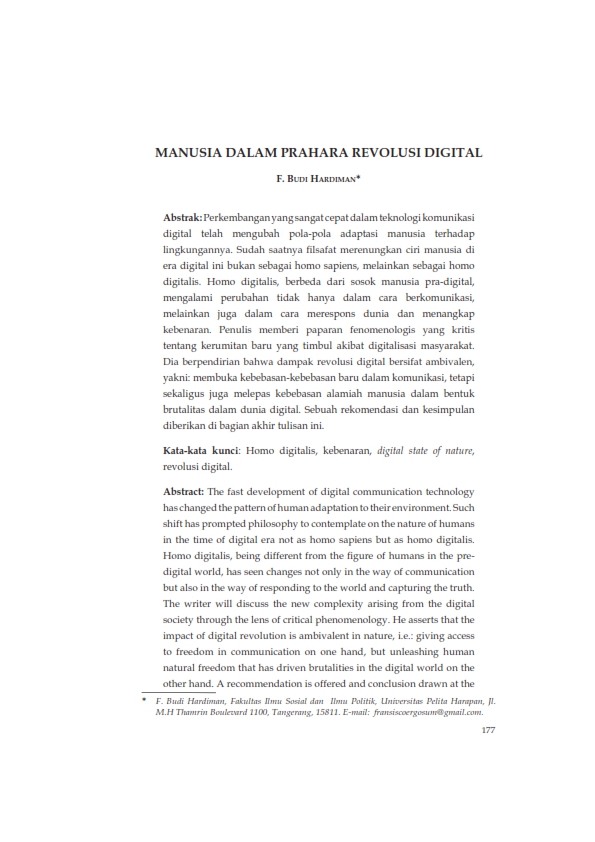Manusia Dalam Prahara Revolusi Digital
Abstract
Abstrak: Perkembangan yang sangat cepat dalam teknologi komunikasi digital telah mengubah pola-pola adaptasi manusia terhadap lingkungannya. Sudah saatnya filsafat merenungkan ciri manusia di era digital ini bukan sebagai homo sapiens, melainkan sebagai homo digitalis. Homo digitalis, berbeda dari sosok manusia pra-digital, mengalami perubahan tidak hanya dalam cara berkomunikasi, melainkan juga dalam cara merespons dunia dan menangkap kebenaran. Penulis memberi paparan fenomenologis yang kritis tentang kerumitan baru yang timbul akibat digitalisasi masyarakat. Dia berpendirian bahwa dampak revolusi digital bersifat ambivalen, yakni: membuka kebebasan-kebebasan baru dalam komunikasi, tetapi sekaligus juga melepas kebebasan alamiah manusia dalam bentuk brutalitas dalam dunia digital. Sebuah rekomendasi dan kesimpulan diberikan di bagian akhir tulisan ini.
Kata-kata kunci: Homo digitalis, kebenaran, digital state of nature, revolusi digital.
Abstract: The fast development of digital communication technology has changed the pattern of human adaptation to their environment. Such shift has prompted philosophy to contemplate on the nature of humans in the time of digital era not as homo sapiens but as homo digitalis. Homo digitalis, being different from the figure of humans in the pre- digital world, has seen changes not only in the way of communication but also in the way of responding to the world and capturing the truth. The writer will discuss the new complexity arising from the digital society through the lens of critical phenomenology. He asserts that the impact of digital revolution is ambivalent in nature, i.e.: giving access to freedom in communication on one hand, but unleashing human natural freedom that has driven brutalities in the digital world on the other hand. A recommendation is offered and conclusion drawn at the end of this paper.
Keywords: Homo digitalis, digital communication, truth, new freedom, digital revolution.

DISKURSUS applies the Creative Commons license (CC BY). We allow readers to read, download, copy, distribute, print, search, or link to the full texts of its articles and allow readers to use them for any other lawful purpose. Full information about CC BY can be found here: https://creativecommons.org/licenses/by/4.0/












